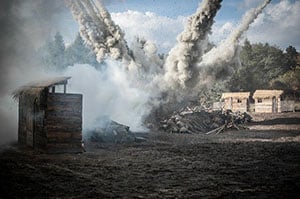 The condition of belligerent is known as belligerence . This adjective (belligerent), in turn, refers to one or something that is combative or that is at war .
The condition of belligerent is known as belligerence . This adjective (belligerent), in turn, refers to one or something that is combative or that is at war .
Belligerence, therefore, is the posture or attitude of someone who is willing to confront another in a violent conflict or is already participating in a warlike action . The term is usually used to refer to countries or armed factions.
Let's take the case of a State administered by a party that seeks to impose its interests by force . The belligerence of the nation , in this framework, is seen in the statements of its rulers and in the policies implemented, which can include everything from the implementation of a plan to develop weapons of mass destruction to attacks on its neighbors.
Under international law , belligerent status is granted to states, national liberation movements and insurgent groups that manage to function territorially as a conventional government. When belligerence is recognized, the actions of the protagonists are framed on a legal level, generating rights and obligations.
This concept can be defined in various ways, since the context in which it is used is decisive both in its nature and in the consequences of the acts that are identified with its meaning.
Public international law, mentioned above, is a branch of foreign public law that focuses on the study and regulation of the behavior of international subjects, among which are States, with the aim of cooperating with all of them and achieving peace. . In its interpretation of the term, it refers to a nation or a political subject that is at war. For politics, on the other hand, the belligerents are those who stand out in a given social conflict.
In some sources we can find the concept of law of war , used in the context of belligerence , and understood as the legal situation that involves several countries, of which a group (whether a nation, a power or another type) has the right to start an armed conflict against another group, which in this context is called "enemy", provided that both sides have the same guarantees.
In greater depth, the law of war is found in the international law and deals with relations between those parties that are formally at war or in the midst of real hostilities as part of a war that has not been declared. This is an extensive group of rules established in international treaties.
 There are two main requirements for international law to consider a nation belligerent: to be subject to it; submit to war. International law recognizes as subjects international organizations, States and natural persons, among others, who are recipients of rights and obligations on their part.
There are two main requirements for international law to consider a nation belligerent: to be subject to it; submit to war. International law recognizes as subjects international organizations, States and natural persons, among others, who are recipients of rights and obligations on their part.
If the conflict is international in nature, it is normally the States and national liberation movements that obtain belligerent status. In the case of inmates, insurgent groups, common participants in civil wars, can also receive it.
In colloquial language , the idea of belligerence is linked to an aggressive or bellicose position . A belligerent company, to mention one possibility, tends to initiate legal cases against its competitors, carry out provocative marketing actions and confront the authorities to defend its business or grow it.
A sports leader who verbally attacks a rival club through the media, to indicate another case, encourages belligerence. This person does not act responsibly or in accordance with his position, but instead incites violence .
